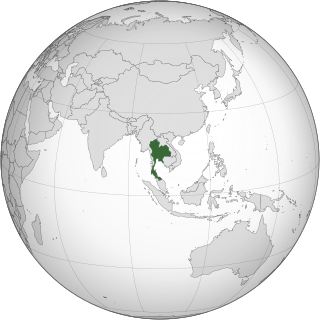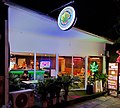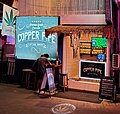Top Qs
Timeline
Chat
Perspective
Cannabis in Thailand
Laws and regulations of cannabis in Thailand From Wikipedia, the free encyclopedia
Remove ads
In Thailand, cannabis, known by the name Ganja (Thai: กัญชา; RTGS: kancha), is currently (as of 25 June 2025) a controlled substance and criminalized.[1] However, cannabis extracts and products are officially limited to 0.2% THC content.[2][3] Only medicinal use is legal, but in practice there is wide recreational usage.[4] Legislation has been proposed which provides for fines for non-permitted uses and fines and jail time for unauthorized sale.[5]

Import and export of cannabis are still highly regulated.
Sales of cannabis plant parts, products, and edibles are prohibited to minors (under 20-years-old), pregnant women, and breastfeeding women. Cannabis smoke is considered a public nuisance and thus prohibited in public areas.[6][7] Public use is sometimes subject to fines under the 1992 Public Health Act.[3]
Remove ads
History
Cannabis appears to have been introduced to Thailand from India, with the similarity of the Thai name to the Indian term ganja cited as evidence.[8] Cannabis has historically been used in Southeast Asia as an ingredient, a kitchen condiment, a medicine, and a source of fiber.[9] Laborers were known to use it as a muscle relaxer. It was reportedly used to ease women's labor pains.[10]
Legal history
Summarize
Perspective

The possession, cultivation, sale, and use of cannabis were criminalised by the Cannabis Act 2477 BE (1935)[11] and again by the Narcotics Act 2522 BE (1979).
In 2018, Thailand became the first Asian nation to legalize medical cannabis.[12][13] Medicinal cannabis, with no THC restrictions, was made legal but required patients to obtain a prescription from a medical practitioner.
Although medicinal cannabis was decriminalised, consumption, in particular smoking or vaping in public places is still subject to punishment under the Public Health Act 2535 BE (1992) as a public nuisance infraction and can lead to a 25,000 Baht fine.[14][15][16]
Anutin Charnvirakul, leader of the Bhumjaithai Party who became health minister and deputy prime minister in 2019, campaigned on legalizing cannabis and cannabis cultivation in Thailand.[13][17] On 8 May 2022 he announced in a Facebook post that the government will distribute one million free cannabis plants to households across the country, starting on the 9 June. The move is said to be a step further into Thailand's plan to use cannabis as a cash crop.[18][19]
In June 2022, the cannabis flower was removed from the country's narcotics list[17] and thus effectively decriminalized. Around 4,200 prisoners were released as a result of the decriminalisation.[20] Cannabis extracts and cannabis products (including edibles, food supplements, cosmetics, etc.) containing less than 0.2% THC were legalized; those with higher THC content continue to require a doctor's order. The new policy also promoted small-scale cannabis farming.
Cannabis dispensaries were available as early as April 2022.[21] Numerous cannabis dispensaries have since opened. Technically, all sales of cannabis are for medical purposes, but the dispensaries do not require buyers to provide doctor's prescriptions.[17]
There have since been efforts to write legislation that would remove the legal gray area around sale of recreational cannabis.[17][2]
On 25 June 2025, shortly after the Bhumjaithai Party had left the ruling coalition as part of the 2025 Thai political crisis, the Thai Minister of Public Health Somsak Thepsuthin from the Pheu Thai Party published new rules, reclassifying the cannabis flower as a controlled herb and prohibiting advertising and sale for recreational purposes. The sale for medical purposes remains allowed but requires a prescription from a doctor, a practitioner of traditional Thai or Chinese medicine, a pharmacist or a dentist.[1][22]
Remove ads
Regulations
Summarize
Perspective
Age
The minimum age to buy, possess and use cannabis in Thailand is 20-years-old.[23][3][24]
Consumption
Cannabis smoking is legal for personal use in private areas but prohibited in public areas by the Public Health Act 2535 BE (1992) with the fine being up to 25,000 Baht (~US$700) and or imprisonment for up to 3 months.[20]
Cannabis is illegal for possession and use by those who are pregnant and/or breastfeeding, with an exception being granted if they can prove they have the permission of a doctor.[3][24]
Medicinal cannabis
Medical cannabis products, including oils and tinctures, with over 0.2% THC requires a prescription for use.[6][7] This includes consumption by smoking or vaping.
Recreational cannabis
Recreational cannabis, often referred to as 'recreational marijuana' or 'marijuana', had become legal under Thai law in 2022, but was recriminalized as of June 25, 2025.
Industrial Hemp
Cannabis or hemp extracts containing less than 0.2% THC is allowed without any restrictions. The most common CBD products are oils, tinctures, gummies, lotions and balms.
Cannabis extracts
Cannabis extracts, including hashish, are still considered a Category 5 narcotic as long as they contain over 0.2% THC. On 9 February 2024 it was announced in the Royal Gazette that the possession of more than 30 grams or 30 milliliters is considered as an intent to distribute. [25]
Cultivation
In order to cultivate cannabis, individuals must register with the country's Food and Drug Administration.[26] There are currently no restrictions on how many plants each individual can cultivate. The specific law regulating cannabis is still pending in Thai parliament as of 2023. However, the government urges people to register their cannabis plantation on the website or the application "Plookganja" (meaning "to plant cannabis") in case that the future cannabis law may require the license.[27]
Supply
Thai law essentially excludes all foreign companies as well as foreign majority companies incorporated in Thailand from producing, selling, importing, exporting, and processing cannabis. The move has been viewed as an effort to protect local companies from the onslaught of highly resourceful and modern technology equipped foreign actors, however "imported" strains are widely available and dominated the market.[28][29]
Distribution
Thailand's first two full-time clinics dispensing cannabis oil for medical treatment were inaugurated in January 2020.[30] The move is in line with the government's intentions to promote licensed use of medical marijuana to address various health conditions. These two clinics are an addition to 25 part-time clinics that are operating since the legalisation of the drug under the new legislation.[31] If this experience produces promising results, the government is all set to open two more clinics as a part of a planned nationwide network of marijuana clinics.[32] The people who were using illegal expensive medical marijuana from underground suppliers are most likely to benefit from it. In addition, the FDA has approved all hospitals of the Public Health Ministry to prescribe medical cannabis to people with approved medical conditions.[33][34]
As of 2025, Thailand has over 11,200 approved cannabis dispensaries, reflecting a significant expansion of access to medical cannabis in the country.[35] This expansion is part of Thailand's broader strategy to integrate cannabis into healthcare and leverage its potential economic benefits. To legally operate a cannabis dispensary in Thailand, businesses must obtain relevant licenses, including a Cannabis distribution license from the FDA for selling cannabis flowers or leaves. The establishment of a Thai Limited Company with the majority of shares owned by Thai nationals is also required.
- Medical cannabis dispensary clinic in Thailand in 2022.
- Cannabis bar in Thailand in 2022.
- Cannabis edibles sold in a supermarket in Thailand in 2023.
- Cannabis shop and bar in Chaweng, Koh Samui, Thailand.
- "Copper Pipe", Cannabis shop in Chaweng Beach, Koh Samui, Thailand.
- Three neighbouring cannabis outlets.
- The WeedLand Krabi - Premium Cannabis Dispensary in AoNang
Remove ads
References
Wikiwand - on
Seamless Wikipedia browsing. On steroids.
Remove ads








